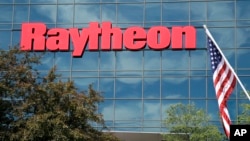China revealed on Tuesday new details of sanctions it previously announced against two U.S. weapons manufacturers, including a ban on Chinese companies doing business with them.
China imposed trade and investment sanctions in February on Lockheed Martin and Raytheon Missiles & Defense, a division of Raytheon Technologies Corp., for supplying weapons to Taiwan, the self-governed island claimed by China.
China's Ministry of Commerce said in a statement late Tuesday that the sanctions include a ban on exports and imports by the two companies from and to China "to prevent Chinese products from being used in their military business."
It added that Chinese companies should "strengthen their due diligence and compliance system construction to verify transaction information" and should not knowingly conduct business with the two companies while importing, exporting or transporting products.
It wasn't clear what immediate impact the penalties might have, but the restrictions on imports and exports could hurt the two companies. The United States bars most sales of weapons-related technology to China, but some military contractors also have civilian businesses in aerospace and other markets.
Last September, Raytheon Missiles and Defense was awarded a $412 million contract to upgrade Taiwanese military radar as part of a $1.1 billion package of U.S. arms sales to the island.
Taiwan buys most of its weapons from the U.S., which is its biggest unofficial ally. In recent years, China has frequently sent fighter jets and warships toward the island, surrounding it at different times in a campaign of military pressure and intimidation.
The sanctions also prohibit the senior executives of both companies from traveling to China or working there. They listed Lockheed Martin CEO James Donald Taiclet, COO Frank Andrew St. John and CFO Jesus Malave, and from Raytheon Missiles & Defense, President Wesley D. Kremer and Vice Presidents Agnes Soeder and Chander Nijhon.




